For business owners and individuals alike, understanding what is public liability and property damage insurance is essential for protecting assets and ensuring financial stability. This type of insurance provides critical coverage in situations where you may be held legally responsible for injuries or property damage caused to others. Whether you’re managing a business, running events, or simply safeguarding your personal assets, public liability and property damage insurance can save you from significant financial loss.
At Unpaid Claim, we specialize in helping Florida residents and businesses navigate insurance complexities. This guide explains the importance of public liability and property damage insurance, what it covers, and how to secure the right policy for your needs.
What Is Public Liability and Property Damage Insurance?
Defining Public Liability Insurance
Public liability insurance is designed to cover legal and financial responsibilities if your actions or negligence result in injury or property damage to a third party. It typically applies to:
– Businesses: For incidents that occur on commercial premises or during operations.
– Individuals: For personal liability arising from accidents.
Defining Property Damage Insurance
Property damage insurance focuses on compensating third parties for damages to their property caused by your actions. This type of coverage is especially crucial for businesses that interact with clients or the public.
When combined, public liability and property damage insurance provide comprehensive protection against lawsuits and claims that could otherwise result in financial ruin.
Why Is Public Liability and Property Damage Insurance Important?
Protecting Against Legal Claims
Accidents can happen unexpectedly, and if you’re held liable, the costs can be staggering. This insurance covers:
– Legal fees.
– Compensation payouts.
– Medical expenses for injured parties.
Ensuring Business Continuity
For businesses, lawsuits and claims can disrupt operations and strain finances. Having the right coverage ensures you can continue operating while addressing claims.
Meeting Contractual and Regulatory Requirements
In many industries, public liability and property damage insurance is a prerequisite for:
– Securing contracts.
– Complying with state and local regulations.
– Gaining client trust.
What Does Public Liability and Property Damage Insurance Cover?
Public Liability Coverage
- Bodily Injury
– Injuries sustained by third parties on your property or as a result of your operations.
– Examples: A customer slipping and falling in a store.
- Legal Defense Costs
– Attorney fees, court costs, and settlement expenses.
- Medical Payments
– Immediate medical expenses for injured parties, regardless of fault.
Property Damage Coverage
- Physical Damage
– Compensation for damage to third-party property caused by your actions.
– Examples: Accidentally breaking a client’s valuable equipment during a service call.
- Replacement Costs
– Covering the costs of repairing or replacing damaged items.
- Business Operations Coverage
– Damage caused during the normal course of business activities, such as construction or maintenance work.
Who Needs Public Liability and Property Damage Insurance?
Small Business Owners
From retail stores to service providers, small businesses face numerous risks when interacting with customers and the public. Liability coverage protects against lawsuits stemming from:
– Accidents on your premises.
– Damage caused by employees during work.
Contractors and Tradespeople
Contractors working on client properties must have coverage to protect against:
– Accidental damage to the property.
– Injuries sustained during the job.
Event Organizers
Public events often involve large crowds, increasing the risk of accidents. Liability insurance ensures you’re covered for:
– Injuries or property damage during the event.
– Claims related to the venue or setup.
Homeowners and Renters
Liability insurance isn’t just for businesses. Individuals can also benefit from coverage for:
– Accidents involving visitors to your home.
– Damage to a neighbor’s property caused by personal actions.
How to Choose the Right Policy
Assess Your Risks
Understanding your specific risks is the first step. Consider:
– The nature of your business activities.
– The likelihood of third-party injuries or property damage.
– The potential financial impact of claims.
Compare Coverage Options
Look for policies that offer comprehensive protection, including:
– Adequate coverage limits for both liability and property damage.
– Inclusion of legal defense costs.
– Customizable options for specific industries or activities.
Verify Policy Exclusions
Every insurance policy has exclusions. Common exclusions for public liability and property damage insurance include:
– Intentional acts of harm or negligence.
– Damage to your own property or employees.
– Professional services (requiring separate professional liability insurance).
Consider Policy Limits
Ensure the policy limits are sufficient to cover potential claims. For high-risk industries, higher limits may be necessary.
Filing a Public Liability and Property Damage Insurance Claim
Step 1: Document the Incident
– Take photos and videos of the damage or injury.
– Gather witness statements and contact information.
– Record the time, date, and location of the incident.
Step 2: Notify Your Insurer
Report the incident to your insurance provider as soon as possible. Provide:
– A detailed description of the incident.
– Documentation and evidence.
– Any relevant receipts or repair estimates.
Step 3: Work with Your Adjuster
Your insurance company will assign an adjuster to evaluate the claim. Be prepared to:
– Answer questions and provide additional documentation.
– Allow the adjuster to inspect the property or incident location.
Step 4: Resolve the Claim
Once the adjuster completes their evaluation, you’ll receive a settlement offer. Review the offer carefully and negotiate if necessary to ensure fair compensation.
Real-Life Scenarios
Retail Store Slip-and-Fall
A customer slipped on a wet floor in a retail store, resulting in a broken arm. The store’s public liability insurance covered the medical expenses and legal fees, ensuring the business avoided financial strain.
Contractor Property Damage
A contractor accidentally damaged a client’s luxury furniture while working on a renovation project. Property damage insurance covered the cost of repairs, preserving the contractor’s reputation and client relationship.
Event Organizer Liability
During a large event, a stage collapse caused property damage and minor injuries. The organizer’s liability insurance covered all claims, allowing the event company to continue operations without financial loss.
Why Choose Unpaid Claim?
At Unpaid Claim, we understand the complexities of liability and property damage insurance. Our team provides:
– Expert advice on selecting the right policy.
– Support for filing and negotiating claims.
– Tailored solutions for businesses and individuals in Florida.
Conclusion
Understanding what is public liability and property damage insurance is vital for protecting yourself, your business, and your assets. Whether you’re a business owner, contractor, event organizer, or homeowner, having the right coverage ensures you’re prepared for unexpected incidents.
At Unpaid Claim, we’re here to help you navigate the complexities of insurance and secure the protection you need. From choosing the right policy to filing and negotiating claims, our experts are dedicated to your success. Visit our website to learn more and schedule a consultation https://unpaidclaim.com
Don’t leave your financial security to chance. Partner with Unpaid Claim for expert guidance and peace of mind.

